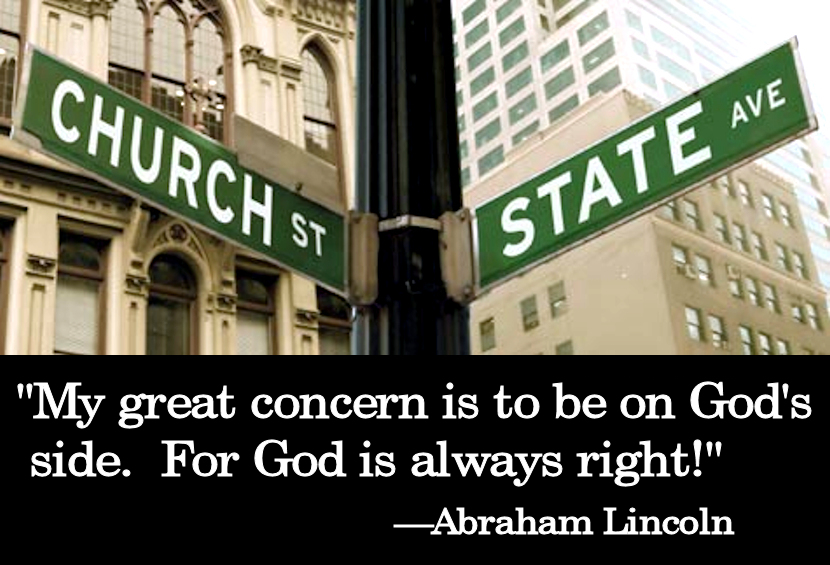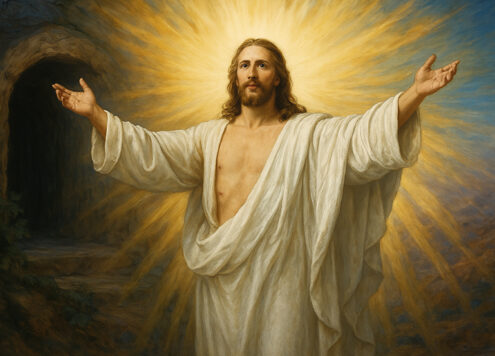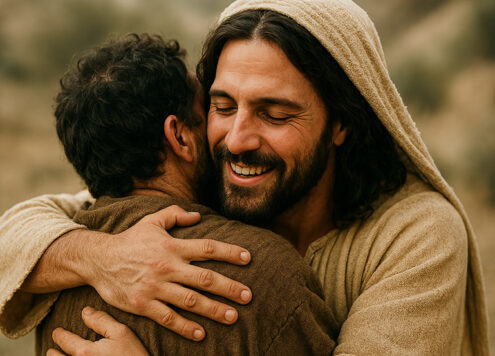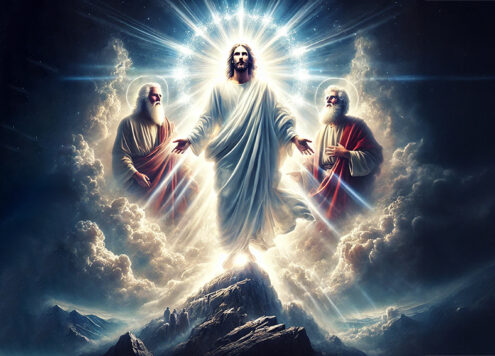The separation of Church and state is a most precious right, enshrined in the Constitution of this country. It has served to guarantee Americans freedom of religion ( not freedom from religion ) for over 200 years.
This separation has become a hotly disputed topic, however, in today’s American culture.
Many Churches are taking a more active part in the political process whenever they view, as threatened, their religious beliefs such as the sacredness of human life, the protection of the environment, and the right to have their values taught and respected in schools and institutions of learning.
The Bible insists that religion must mingle with the everyday lives we lead. Justice is a practical virtue, highly esteemed in the scriptures. It is also the foundation of any system of government. Thus it belongs to the state, as well as the Church. The same can be said of the other three cardinal virtues: prudence, temperance, and fortitude. The moral virtues of freedom, honesty, compassion, respect for others, and integrity, while being an integral part of religion, also contribute to the welfare of the state for they serve the betterment of the individual citizen.
Jesus makes one very important statement about the rights of the State and the rights of God. He says, “Render to Caesar ( the State ) what belongs to Caesar, and to God what belongs to God” ( Gospel of Matthew 22 : 21 ). He does not divide reality into two conflicting spheres. Rather, He sees man’s obligation as twofold, with duties both to the State and to God.
There are many religious traditions just as there are many political traditions in our modern, pluralist society, yet they need not be mutually opposed or exclusive. They can co-exist harmoniously. This is why Jesus asks us to respect both the law of the land and the law of God.
By saying that we must “give to Caesar what is Caesar’s” Jesus stresses the need to fulfill our obligations to each other in the political and social world. By asserting that we must “give to God what is God’s” Jesus emphasizes our spiritual and moral obligations which can only be satisfied by being faithful to our conscience and our religious beliefs. Involvement in the political life of society and involvement in the life of the Church should go hand in hand. You cannot have a good society without good people, and it is difficult to have good people without a good society.
Still, it is not easy to be a Christian in today’s society. The temptations are everywhere in our liberal, secular society that espouses and practices certain “freedoms” contrary to religious beliefs.
As followers of Christ, we are called to give both the State and God what is theirs. But the Gospel does not give us a simple answer. Discovering what society needs, and realizing what God deserves can only happen with hard work. Jesus gives us the general rule, in Matthew 22: 15-21, with regard to our responsibility toward God and State, but He does not address the specifics or the details because they are always changing.
Being a good Christian requires a life of decision-making, a life of learning, and a life of fidelity to our Christian calling in this world. We are called, not to be of the world, but to live in the world as committed Christians, as the leaven of society.
The great theological virtues of faith, hope and love are gifts of Almighty God that enable one to experience His saving grace in this life. They are gifts which cannot be forced on anyone, yet their fruits are so marvelous they benefit everyone. The following three examples illustrate the benefits for mankind when “people of good will” and society work hand in hand.
- Mother Teresa demonstrated these gifts of grace in India, and was recognized, not rejected, for her heroic dedication to the country’s poor by being awarded a State funeral by a grateful Hindu nation.
- Similarly, Sister Ruth Pfau, from Dresden, Germany, became a marvelous channel of God’s gifts to the people of Pakistan by eradicating leprosy in that country. She too was awarded a State funeral by a grateful Muslim Nation.
- Fr. Damien of Molokai is another outstanding example of the power of God’s gifts to transform society. These committed Christians, by their courageous example, rendered to God what was God’s and to society what belonged to society.
Such, after all, is life at its best when one truly “renders to Caesar (The State) what is Caesar’s and to God what is God’s.”
—Fr. Hugh Duffy











4 Comments
Elmo Hudson
Author-Brother: Elmo Hudson! Michigan Capital City first ‘BLACK’ “Boxer of the Year” and New Al VanNess ‘Appreciation and made ‘Sports Memories’ and Named one of the most dedicated boxers in The ‘City of Lansing’ by Dick Letts of Lincoln Center Boxing Team, written in The ‘Lansing State Journal by Jim Wallington ‘Sports Writer’.in 1964, 1965, 1966, 1969 and 1971. I also was healed of Alzheimer’s.
Frank Mashuda
Catholics should vote for pro life candidates who defend our Church’s right to speak freely. Otherwise, our Church will be controlled by the secular state’s “infinite” powers like in Cuba, China, or Viet Nam.
We are about to be cancelled by the mob.
Lie the statues of Lincoln, Columbus, and Mary, our standing as Americans will be destroyed by the Bide-Harris administration.
Larry Frey
Thank you Ft. Duffy for your enlightenment! We humans all work for a reward, usually 8 hours, as money makes the world go around! But at the end of the day we realize that everything comes from God and at the end of this life, through diligence, our greatest reward will be to walk in the kingdom of Heaven with God!!! And our ancestors as well!!! Thanks be to God!!!
Hugh Duffy
Good Larry. That is a beautiful approach you’ve outlined. It’s positive, practical and faith-driven. It’s not driven by propaganda which we hear enough of in today’s political climate. Would that people could conduct their affairs with charity towards all and malice towards none!